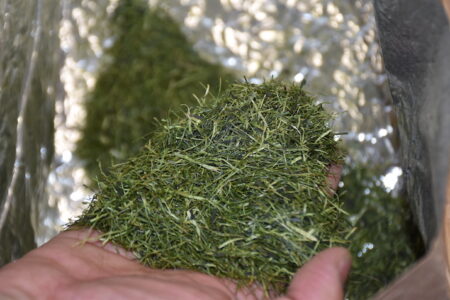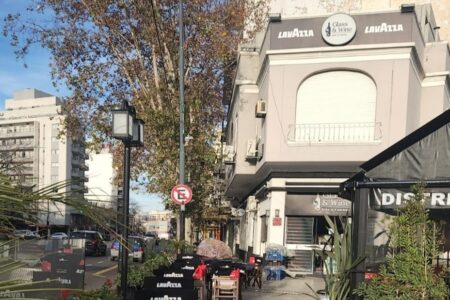Special Sustainability Section; suppliers embrace sustainability
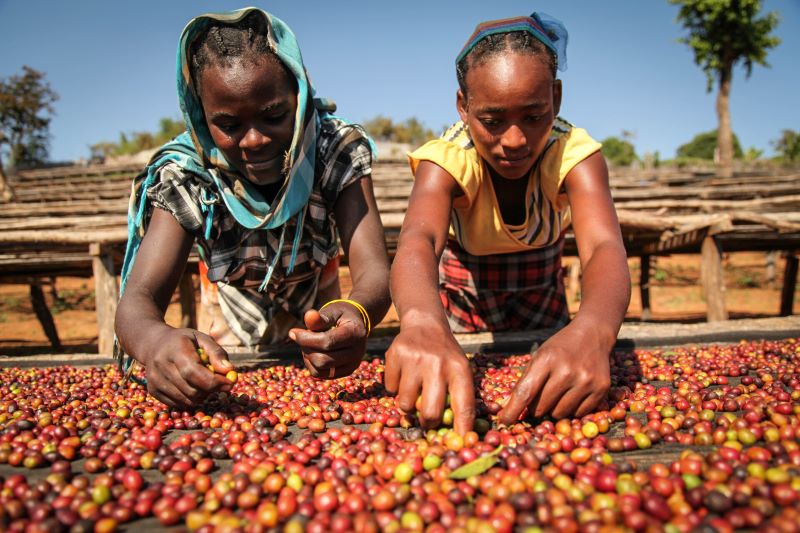
Image: Kloth & Köhnken Teehandel
As with the coffee and tea brands they work with, suppliers in the coffee and tea industries have long been advocates for sustainable practices. Many suppliers have their own programs in origin countries to advance sustainable measures while others work with the brands they supply or organisations to develop or improve sustainability at the heart of the coffee or tea supply chain. And machinery manufacturers are also working steadfastly to make their equipment more sustainable as well. Below, some of the leading global suppliers –both raw materials and machinery –to coffee and tea brands discuss their sustainability efforts.
Efforts at Origin
Buencafé
In today’s world, organisations are being called upon to strengthen business relationships and establish connections that support the well-being of both the planet and its people. Buencafé, as the industrial factory of the Colombian Coffee Growers Federation (FNC), specialises in the production of 100percentColombian freeze-dried coffee, with a mission to promote the well-being of the country’s 548,000 families that make their living growing coffee. As part of its 50thanniversary celebration, clients received a unique invitation: an art collection inspired by the Coffee Cultural Landscape that encourages them to learn about the social and environmental projects in which Buencafé invests 100percentof its profits and to get involved in them.

Artwork inspired by the Coffee Cultural Landscape highlighting Buencafé’s social and environmental projects. Image credit: Buencafé
The project initiatives encompass various areas including education, water, reforestation, nutrition, and infrastructure, all of them aligned with the United Nations’ Sustainable Development Goals. In the realm of education, the FNC has created an inclusive and high-quality model that enjoys global recognition, tailored for rural youth. With regard to environmental conservation, technologies that protect water usage and access are developed and implemented. Moreover, reforestation programs that empower women in their commitment to environmental preservation are promoted. Last but not least, social initiatives focused on food security and infrastructure aim to bring wellbeing to coffee growers and families in rural areas. Organisations like the FNC aim to be bridges bringing sustainable value into the coffee industry. (Learn more at https://www.buencafe.com/sustainability-initiatives/.)
Global Coffee Platform
The Global Coffee Platform (GCP) has officially entered a new era of strategic collective action for coffee sustainability, when in June 2023,a leading group of eight member companies backed the initial round of funding for the platform’s new effort: GCP 2.0.
Underpinned by an ambitious goal of transformational change on the prosperity of more than one million farmers in more than 10 countries by 2030, the combined USD $1.5m kick-off funding from JDE Peet’s, Melitta Group, Mother Parkers’ Coffee & Tea, Nescafé, Nespresso, ofi (olam food ingredients), Rabobank and Westrock Coffee Company, is a response to the bold challenge laid out by GCP for the entire sector to ramp up collective action to fully unlock coffee’s potential as socio-economic motor and a nature based climate solution.
GCP Collective Action Initiatives in countries such as Brazil, Vietnam and Uganda have already shown that alignment on priorities and building on local knowledge and structures allows efficiency gains and business critical collective solutions. GCP 2.0 scales these successful models of co-investment through entrepreneurial country programs, developed with multi-stakeholder Country Platforms in initially six countries. Thanks to global and local co-investments, and larger public agencies and philanthropic co-funding, GCP 2.0 aims at ensuring the viability of sustainable coffee while delivering measurable progress on living income towards the GCP 2030 Goal.
Annette Pensel, GCP executive director, said the kick-off funding enables GCP to grow, attracting new talent and further revenue, including public co-funding that is key to accelerate the first six entrepreneurial country programs to investment-ready levels and support the development of aligned measurement in the form of GCP Country Reports. “GCP Members are united in the belief that coffee sustainability is a shared responsibility. We are grateful that these eight GCP Members have stepped forward with this initial round of co-funding which is crucial to generating adequate level of investment and change.”
The GCP 2030 Goal aims to close the living income gap by at least 25 percent for more than one million smallholder farmers in more than 10 countries by 2030. The focused local collective actions in coffee producing countries together with local stakeholders, are complemented with a global drive to increase sustainable sourcing.
“Collective action is essential to not just ensuring compliance but also accelerating measurable sustainability at scale to bring solutions to over one million smallholders who grow the coffee we all love,” explained GCP board chair, Carlos Brando.
Kloth & Köhnken Teehandel GmbH
Kloth & Köhnken Teehandel GmbH offers fine teas, sophisticated formulations and flavoured/scented tea innovations and has espoused sustainable values since its formation. It believes that sustainable actions cannot be decreed, rather it is a learning process.
FairBioTea (fairbiotea.de) is a private sector initiative focused on the development of healthy and sustainable, fair and ecological tea production operations and tea industry. Through its FairBioTea development partnerships, Kloth & Köhnken actively supports Chinese tea farmers who are growing sustainably and improving their quality management.
Since 2007, together with selected tea gardens, Kloth & Köhnken has been helping to make farming more ecological, transparent and sustainable. The company is especially proud of its longstanding cooperations in tea-producing countries where its partners dictate the pace at which they adopt environmentally friendly practices. Through FairBioTea, Kloth & Köhnken establishes a fair and reliable framework for transparent, sustainable tea production, culminating in a premium product.
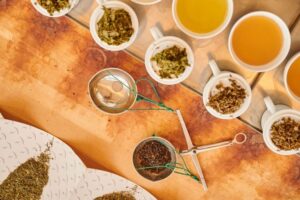
Image: Kloth & Köhnken Teehandel
Most teas Kloth & Köhnken purchases are certified (Rainforest Alliance, Fairtrade, organic and Fairbiotea). Its certified products exceed the EU organic regulations, and their cultivation also encompasses land use and nutrient cycles, which in the long term will help preserve soil fertility.
Additionally, for more than two years, Kloth & Köhnken’s sustainability team has been working to implement all requirements for the new German due diligence law and for the European regulations to come. This includes the Code of Conduct, which defines internal company requirements as well as minimum standards for environmental, social and ethical obligations. The Code of Conduct is the basis for developing a business relationship with Kloth & Köhnken, which supports companies that take care of their business sustainably, treat their employees well and protect the environment.
Furthermore, under the motto ‘K&K Goes Green’, the topic of sustainability will become more of a focus for Kloth & Köhnken and internal processes will be optimised and made more efficient. This includes asking all employees for suggestions and ideas and raising awareness for a more sustainable way of living.
Neumann Kaffe Gruppe (NKG)
We all know the coffee industry is facing major challenges. But we are convinced that joint efforts can lead to the right path. To embark on this journey and live up to our responsibility, NKG has developed our NKG Responsible Business Program (RBP), which builds the framework for our group’s sustainability efforts.
To achieve the goals of the RBP and secure the future of coffee, we undertake a variety of efforts within NKG and in partnerships with NGOs, governments, customers, banks and others. Our efforts start where our beloved coffee comes from and where we most urgently need to fight for its future: on the ground. Through our global network covering 26 countries, NKG’s diversified sustainability efforts reach down to farm level to create sustainable supply chains benefitting everyone contributing to our daily cup of coffee. More than 250 employees worldwide work on solutions to tackle global as well as local challenges.
We believe that there is no one-size-fits-all solution for sustainability! Therefore, our efforts range from global initiatives to local projects. Our global initiatives are NKG Verified, our program for sustainable coffee supplies to green buyers, and NKG Bloom, our program for sustainable livelihoods. Through NKG Bloom, we identify and provide the services producers need to address their key challenges and make coffee farming an attractive business for them and their families. We invite you to share your thoughts with us! Together, we must take responsibility today and build a sustainable coffee industry for tomorrow.(Contact our Sustainable Business Unit in Hamburg, Germany: [email protected].)
Sustainable Business Practices
Finlays
As sustainability continues to rise up the agenda in the tea and coffee industry, Finlays is sharing lessons it has learnt from its recently-concluded five-year sustainability strategy. A leading global B2B supplier of tea and coffee ingredients, Finlays is aiming to encourage healthy debate within the tea and coffee world about the challenges of delivering against sustainability commitments in the industry.
The lessons, compiled by group head of sustainability Joe Yalley-Ogunro, reflect candidly on Finlays’ Sustainable Future strategy. While the report details strong progress in some areas, such as achieving 100 percent traceability in tea, 97 percent traceability in coffee, and reducing Scope 1 and 2 carbon emissions by 34 percent since 2018, it also underlines areas where Finlays fell short of its targets.
“Globally, the subject of sustainability has never had a higher profile, but the sustainability challenges our industry faces have also never been more complex. As we start to deliver our new sustainability strategy, we hope that sharing what we have learnt –and how this is shaping our future approach –is useful to others who are facing the very same challenges,” explained Yalley-Ogunro.
Rekerdres & Sons
Rekerdres & Sons is a third generation Dallas-based boutique insurance agency specialising in insurance for the commodity trade. Over 15 years ago, ‘Reksons’ saw a correlation between lower client losses and clients conducting soft commodity trading under sustainable principles. To test this, Reksons led a two-year loss ratio study, in which it confirmed that careful and motivated origin producers applying the principles of counting, training, and tracing from the interior outward radically reduced losses such as water, contamination, theft, and infestation. Thus, sustainability in the coffee supply chain actually leads to an improved state of risk which mutually benefits both merchant clients and insurance companies.
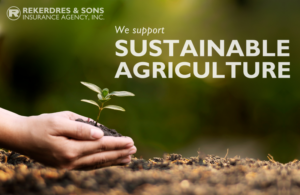
Rekerdres offers financial recognition for businesses that have adopted sustainable AG practices. Image credit: Rekerdres & Son
Due to this discovery, we developed our ‘Green Dividend’ Program in 2008. The Green Dividend is a financial recognition for merchants who have adopted sustainable AG operations within the tenants of sustainability. Thus, participants must implement programs where they train their producers, count their stocks, and track their coffee as it moves through the supply chain. Participating policyholders then designate a foundation or beneficiary to receive the annual dividend from Reksons and our participating underwriter with the intent to further improve sustainability. As the Green Dividend encourages best practices, which thus reduces client claims, everyone comes out on top.
Interested companies should contact Rekerdres & Sons to find out more about our exclusive “Green Dividend” and how to better both the planet and your business.
Sustainable Machinery & Packaging
Modern Process Equipment
MPE, a global leader in dry bulk solids conveying solutions, has a new line of advanced power-saving innovations called Green Knight Energy Reduction Technology (ERT) for Chain-Vey®tubular drag conveyors. MPE’s R&D teams developed new software and sensor integrations to reduce the energy consumption of Chain-Vey conveyors. The Chain-Vey line of Green Knight ERT engages automatically and preserves the same rate of product flow. No reduction of conveyance throughput is experienced by operators. In addition to the electricity savings, the ERT reduces system wear on conveyor components.(Visit mpechicago.com for more information.)
Scolari
The growing environmental concern has also involved the coffee industry. Besides sustainable cultivations and environmentally friendly packaging, we need to put more effort into reducing CO2 emissions when producing coffee by abandoning fossil fuel in favour of renewable sources.
Scolari Engineering, based in Milan, Italy provides fully integrated coffee roasting manufacturing systems for consistent quality and lower production costs. The company’s e-Roaster is the latest generation of hybrid roasters moving to renewable energy, benefiting the environment. Moreover, it increases efficiency thanks to the smart heat recovery systems based on the concept of green coffee preheating synchronized with the roaster cycle.
The planet is increasing the share of electricity produced with renewable sources (photovoltaic systems, wind farms, and hydropower plants). And in some countries, the amount of electricity available is already higher than that of natural gas. Furthermore, hydropower sources are undoubtedly the cleanest in terms of pollutant emissions.
Scolari’s e-Roasters use electricity alternatively to natural gas during the first heating stage, thanks to a set of heating elements. The result is a significant reduction in carbon energy released into the atmosphere. In addition, using electricity from renewable sources allows us to be more sustainable. Effects that we add to our sustainability report.
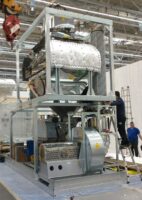
Scolari preheater Image credit: Scolari Engineering
In terms of consumption, Scolari’s e-Roasters are fitted with a heat recovery system for preheating green coffee. This technology reduces 25 percent of the system’s energy needs without affecting quality. Fewer emissions, less consumption, more efficiency. Moreover, the recovered heat can be used in other processes such as in-absorption refrigerators to quickly cool toasted coffee beans and preserve the aroma, or in buildings’ heating and air conditioning systems.
The e-Roaster technology will make Scolari’s hybrid roasters stand out in the future. It can also be used for retrofitting existing systems to reduce their environmental impact and produce coffee in a much more sustainable way.(For more information contact, visit: Scolarieng.com.)
Tecpacking Group Co, LTD
Packaging plays a vital role in the sustainability of the tea industry. It is crucial for tea companies to explore alternative packaging solutions that are eco-friendly, recyclable, and reduce waste generation.
Tecpacking has responded to the sustainability challenge by introducing its revolutionary Eco Mesh product. The EcoMesh is an innovative packaging solution designed specifically for the tea industry. It combines the benefits of sustainable materials and a functional design to provide a superior packaging option. The Eco Mesh is made from biodegradable and compostable materials. This ensures that the packaging does not contribute to the accumulation of plastic waste and reduces the environmental impact associated with traditional packaging materials. (For more information, visit: tecpacking.com.)

Tecpacking has introduced its Eco Mesh, designed specifically for the tea industry. Image credit: Tecpacking
Certification
Demus SpA
Demus SpA has been operating since 1962 in the field of decaffeination, dewaxing, vaporization and detoxification of green coffee, as well as in the production and sale of natural raw caffeine.
Since its founding, many things have changed, not only in company terms with industrial expansions, new decaffeination methods (water process), analysis laboratory and acquisition of new neighboring areas; the market has really changed, moving towards sustainability strategies, with the need to improve environmental performance and safety. With this in mind and in line with market demands, Demus SpA began its certification process in 1999 with the obtaining of the following certifications: ISO 9001 -Quality Management System, ISO 14001 -Environmental Management System, OHSAS 18001 which was transformed into ISO 45001 -Occupational Health and Safety Management Systems, and FSSC 22000 -Food Safety Certification, ISO 50001 -Energy Management Systems.
Through the certification processes, Demus has developed a concept of:
- Corporate environmental sustainability: we contribute significantly to combatting environmental challenges and climate change, reducing consumption and pollution emissions, using renewable energies (a photovoltaic system was recently installed), limiting water consumption (important in this time period) and carefully disposing of waste. Furthermore, circular economy solutions are adopted as evidenced by the “Best performer of the circular economy” promoted by Confindustria, the main representative organization of Italian manufacturing and service companies;
- Social sustainability: dealing with occupational safety, workers’ rights and equality and social justice. Thanks to the voluntary Rainforest Alliance certification which deals with sustainable agriculture and has allowed Demus to create a ‘sustainability policy’ with the implementation of a system based on meritocracy and equity, without differentiation of gender, origin and religion.
The religious theme is also addressed with the Halal religious certifications, for countries of Muslim origin and Kosher for countries of Jewish origin. For Demus, the well-being and inclusion of the personnel working in the company is an important topic in which to make investments. For this reason, at the beginning of this year, Demus SpA joined the WHP program (Workplace Health Promotion), promoted by the World Health Organization, the implementation of effective good practices in the field of health promotion. Various initiatives have already been implemented such asatraining campaign on health and eating and a campaign for the renewal of tetanus vaccinations promoted.
Economic Sustainability: which concerns the ability of an economic system to produce income and work in a lasting way and is the basis of sustainable development. Demus also complies with this aspect with investments in innovation, technology and digitisation of processes, applying a very punctual policy on the price of the decaffeination service, always taking into consideration the current economic situation.
- Aubrye McDonagh Leigh

